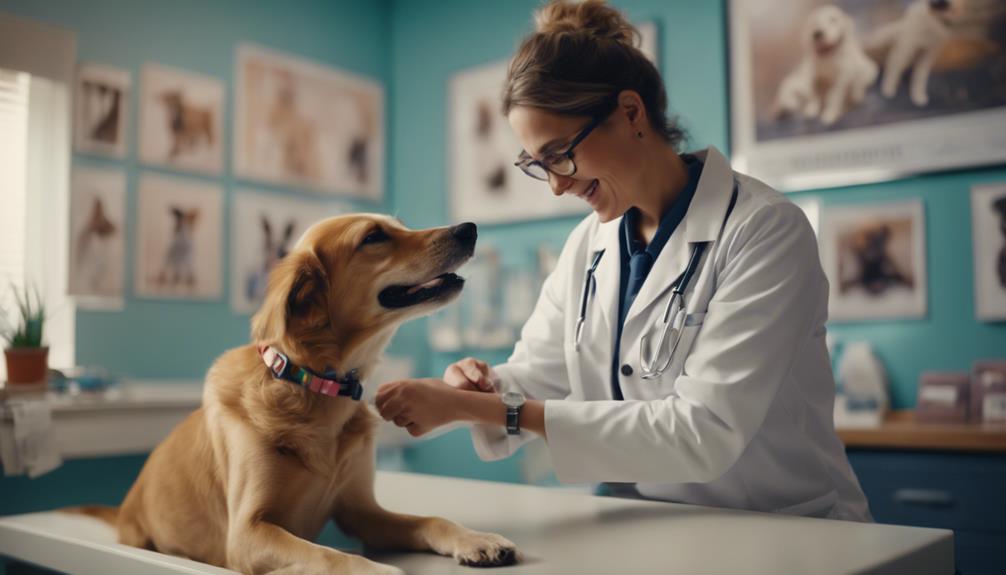Ensuring the well-being of adopted dogs requires a multifaceted approach that addresses both physical and mental health. From the importance of regular veterinary check-ups to the necessity of a balanced diet tailored to their specific needs, the foundation of a healthy lifestyle begins with informed choices. Additionally, incorporating exercise and mental stimulation is crucial to prevent behavioral issues and foster a strong bond between pet and owner. However, many owners often overlook the subtle signs that may indicate underlying concerns. Understanding these aspects can significantly enhance the quality of life for your new companion.
Regular Veterinary Check-ups

Ensuring regular veterinary check-ups is crucial for the health and well-being of adopted dogs, as these visits facilitate early detection of potential health issues and provide essential vaccinations.
Regular check-ups are a key part of preventive care, helping to keep your dog healthy throughout their life. These appointments allow veterinarians to assess your dog's overall condition and recommend a vaccination schedule tailored to their specific needs.
During these visits, common concerns such as dental health, weight management, and parasite control can be addressed.
Additionally, regular check-ups strengthen the bond between pets and their owners by fostering a sense of responsibility and care.
Prioritizing these veterinary visits will ultimately lead to a happier, healthier life for your adopted dog.
Balanced Nutrition and Diet
Regular veterinary check-ups can help establish an appropriate nutritional plan, which is vital for the overall health and longevity of adopted dogs.
A balanced diet incorporates high-quality commercial dog food or homemade meals, ensuring dogs receive essential nutrients. When preparing homemade meals, focus on lean proteins, whole grains, and fresh vegetables, while avoiding harmful ingredients like onions and chocolate.
Additionally, dietary supplements may be recommended to address specific health needs, such as joint support or skin health. Always consult your veterinarian before introducing new foods or supplements to your dog's diet, as individual needs can vary significantly.
Exercise and Physical Activity

Incorporating regular exercise and physical activity into an adopted dog's routine is essential for maintaining their physical health and emotional well-being.
Engaging in outdoor adventures, such as hiking or visiting dog parks, provides opportunities for dogs to explore their environment and socialize with other animals.
Additionally, establishing playtime routines at home, including fetch or tug-of-war, fosters bonding between the dog and their owner.
Aim for at least 30 minutes of exercise daily, adjusting the intensity based on the dog's age and breed.
Regular physical activity helps prevent obesity, reduces behavioral issues, and promotes a healthier lifestyle.
Mental Stimulation and Enrichment
Providing mental stimulation and enrichment is crucial for adopted dogs, as it helps keep their minds sharp and reduces the likelihood of behavioral problems.
Engaging your dog with interactive toys can provide hours of entertainment. These toys challenge their problem-solving skills while keeping them physically active.
Additionally, incorporating training games into your routine fosters a stronger bond between you and your dog. Simple tasks like 'sit,' 'stay,' or agility exercises can be both fun and rewarding.
Consider varying the activities to prevent boredom, as dogs thrive on routine and novelty. Other options include puzzle feeders or hide-and-seek games, which encourage exploration.
Monitoring Behavioral Changes

Monitoring behavioral changes in adopted dogs is essential for identifying potential issues and ensuring their overall well-being. During the adjustment period, dogs may exhibit various stress signals, such as excessive barking, hiding, or changes in appetite. These behaviors can indicate anxiety or discomfort with their new environment.
To effectively monitor these changes, keep a daily journal noting any unusual actions or patterns. Look for consistent changes over time rather than isolated incidents.
If stress signals persist, consult a veterinarian or a professional dog trainer for guidance.

